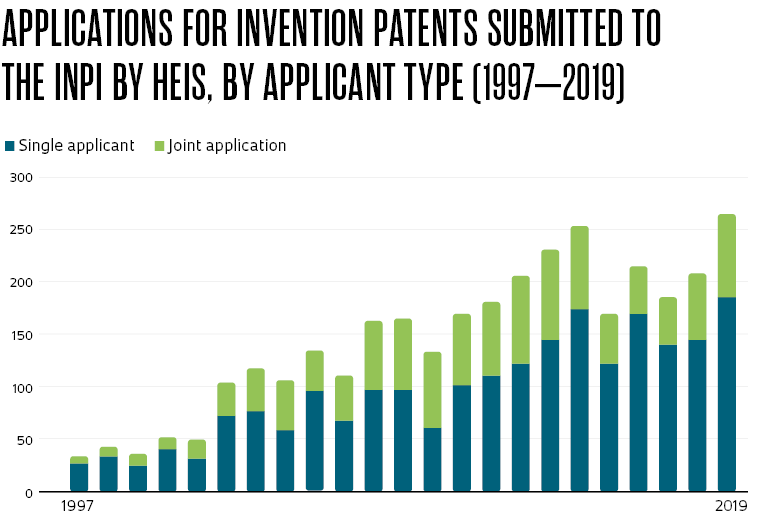- Compared to other countries, higher education institutions (HEIs) in Brazil play an exceptionally high (and growing) role in activities involving patents. Between 2000 and 2019, the share of all applications submitted to Brazil’s National Institute of Industrial Property (INPI) filed by HEIs rose from 2% to 27.4%
- The role played by HEIs is also high in São Paulo. Whether as a single applicant or as co-applicant, HEIs located in the state1 have shown an upward trend in this field, although there have been fluctuations
DATA
Patents and partnerships at state universities in São Paulo

- In total, 3,331 patent applications were submitted to the INPI in the period with an HEI named as at least one of the applicants. The vast majority of these HEIs were state universities, with 2,710 or 81% of the applications. In the same period, federal public universities located in São Paulo—UFSCar, UNIFESP, and UFABC—filed 315 patents as single or joint applicants
- Among state institutions, UNICAMP filed the largest number of applications (1,190), followed closely by USP (1,124), with UNESP trailing in third (410). Patent applications filed by two or more of these HEIs counted towards the figures for all of them, meaning the same application may have been counted more than once
- In addition to its overall lead, UNICAMP was a single applicant in most of the patents it filed (79%). In contrast, USP was the sole applicant of just 57% of its patents, with 43% filed jointly with other institutions. While UNESP filed fewer patent applications in absolute numbers, just one-third of them were submitted in partnership with other institutions
- Regarding the status of the co-applicants, UNICAMP favored other HEIs and companies, while USP preferred partnerships with government agencies, followed by companies and other HEIs. Most joint applications filed by UNESP were with other HEIs and government agencies. Partnerships between the three universities and private businesses included 126 companies, including Petrobras, Padtec, Braskem, and Companhia Paulista de Força e Luz

Note (1) University of São Paulo (USP), University of Campinas (UNICAMP), São Paulo State University (UNESP), Federal University of São Paulo (UNIFESP), Federal University of São Carlos (UFSCar), and Federal University of ABC (UFABC) Source INPI, Office for Economic Affairs Prepared by FAPESP, DPCTA/Studies & Indicators Team
Republish
